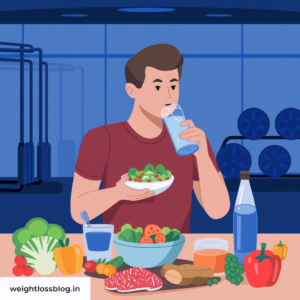The Essential Do’s and Don’ts of the Vegetarian Diet for Weight Loss
Introduction
The vegetarian diet is a plant-based eating style that promotes health, weight loss, and environmental sustainability. While it can be highly effective for weight loss, it’s important to follow certain guidelines to ensure you’re meeting your nutritional needs and achieving your goals. This list of do’s and don’ts will help guide you through the vegetarian diet and maximize your  chances of success.
chances of success.
Do’s of the Vegetarian Diet
1. Do Focus on Whole, Unprocessed Foods
The foundation of a successful vegetarian diet is whole, unprocessed foods. These foods are naturally lower in calories and higher in essential nutrients, making them ideal for weight loss. Build your meals around fresh fruits, vegetables, legumes, and whole grains to ensure you’re getting all the vitamins, minerals, and fiber your body needs.
By avoiding processed vegetarian foods, which can be high in added sugars, unhealthy fats, and sodium, you’ll maximize the health benefits of the vegetarian diet and support sustainable weight loss.
2. Do Include Protein in Every Meal
Protein is essential for weight loss, muscle maintenance, and overall health. Make sure to include a source of plant-based protein in every meal, such as beans, lentils, tofu, or quinoa. If you follow a lacto-ovo diet, eggs and dairy can also be excellent sources of protein.
Including protein in every meal will help keep you full and satisfied, preventing overeating and supporting your weight loss goals.
3. Do Take Nutritional Supplements
Because the vegetarian diet excludes meat, it can sometimes be challenging to get enough of certain nutrients like iron, vitamin B12, and omega-3 fatty acids. Consider taking supplements for these nutrients to ensure you’re meeting your body’s needs. You can also include fortified foods like plant-based milks and cereals to help meet your nutritional requirements.
Taking the right supplements will help prevent nutrient deficiencies and support long-term health on the vegetarian diet.
4. Do Plan Your Meals Ahead of Time
Meal planning is crucial for success on the vegetarian diet, especially if you’re new to plant-based eating. Planning your meals ahead of time ensures that you have balanced, nutrient-rich options on hand, reducing the temptation to reach for processed foods or snacks.
Prepare meals in bulk and keep healthy snacks like fruits, nuts, and hummus available to stay on track with your weight loss goals.
5. Do Watch Portion Sizes
While the vegetarian diet is naturally lower in calories, it’s still important to watch your portion sizes, especially with higher-calorie foods like nuts, seeds, and oils. Eating large portions of these foods can lead to excess calorie intake, which may hinder your weight loss progress.
Practice mindful eating and use smaller plates to help control portions without feeling deprived.
Don’ts of the Vegetarian Diet
1. Don’t Rely on Processed Vegetarian Foods
Just  because a food is labeled “vegetarian” doesn’t mean it’s healthy. Many processed vegetarian foods, such as meat substitutes, packaged snacks, and frozen meals, can be high in unhealthy fats, sodium, and added sugars. These foods can be calorie-dense and may hinder your weight loss progress.
because a food is labeled “vegetarian” doesn’t mean it’s healthy. Many processed vegetarian foods, such as meat substitutes, packaged snacks, and frozen meals, can be high in unhealthy fats, sodium, and added sugars. These foods can be calorie-dense and may hinder your weight loss progress.
Focus on whole, plant-based foods like fruits, vegetables, legumes, and whole grains to get the most nutritional benefits and support sustainable weight loss.
2. Don’t Skip Meals
Skipping meals can lead to overeating later in the day and disrupt your metabolism. It’s important to eat regular, balanced meals throughout the day to maintain energy levels and prevent excessive hunger.
Even if you’re not feeling hungry, try to eat three meals a day that include a source of plant-based protein, healthy fats, and complex carbohydrates to keep your metabolism functioning optimally and support weight loss.
3. Don’t Forget About Protein
One of the common challenges of the vegetarian diet is getting enough protein. While plant-based foods can provide plenty of protein, it’s important to include them in every meal to ensure you’re meeting your daily protein needs.
Skipping protein-rich foods can lead to muscle loss, fatigue, and difficulty maintaining your weight loss. Make sure to include sources of plant-based protein like beans, lentils, tofu, or eggs (if applicable) in every meal.
4. Don’t Overeat High-Calorie Plant Foods
While foods like nuts, seeds, and avocados are healthy, they are also calorie-dense and can lead to weight gain if eaten in large quantities. Be mindful of portion sizes when consuming high-calorie plant foods, especially if your goal is weight loss.
Moderation is key when incorporating these foods into your diet. A small handful of nuts or a few slices of avocado can provide the healthy fats you  need without adding too many extra calories.
need without adding too many extra calories.
5. Don’t Neglect Variety
Eating a variety of plant-based foods is essential for meeting all your nutritional needs on the vegetarian diet. Relying on the same few foods can lead to nutrient deficiencies and make your meals less enjoyable.
Experiment with different vegetables, grains, legumes, and plant-based proteins to ensure you’re getting a wide range of nutrients and keeping your meals interesting and satisfying.
Conclusion
The vegetarian diet is a highly effective and sustainable way to lose weight while improving overall health and supporting ethical values. By following these essential do’s and don’ts, you can maximize your success on the vegetarian diet and achieve your weight loss goals while maintaining a balanced, nutritious, and enjoyable eating plan.
Focus on whole, unprocessed foods, include plant-based protein in every meal, and stay hydrated to ensure long-term success on your plant-based journey.